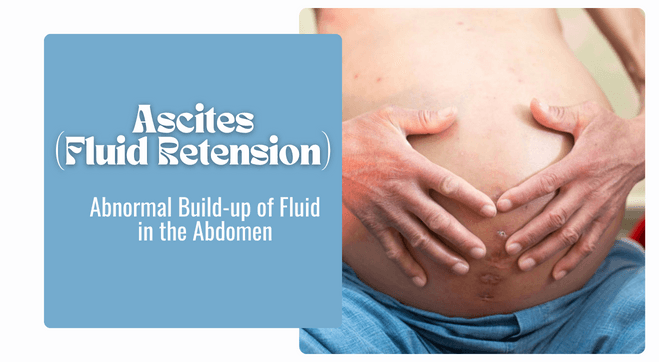Ascites, a condition marked by fluid build-up in the abdomen, commonly referred to as water in stomach, may manifest with subtle changes in gut health. While it can stem from various underlying health issues, including liver disease, early detection is crucial.
We can better manage this challenging condition by recognising the ascites signs and symptoms and understanding the causes.
What is Ascites (Fluid Buildup in Abdomen)?
Ascites is the medical term for a condition in which fluid accumulates between the tissue of the belly and the organs in the abdomen. In other words, unexplained water in stomach means you have Ascites disease.
Doctors may not diagnose all instances of a fluid-filled belly or symptoms of water in stomach as abdominal ascites. The patient must have over 25 ml 1 of fluid in stomach to be diagnosed with ascites.
Did you know:
- About half of the patients with decompensated cirrhosis develop ascites within 10 years.
- The development of ascites (fluid buildup in abdomen) marks the transition of cirrhosis from the compensated to the decompensated stage.
- The 5-year mortality rate of cirrhotic ascites ranges from 15% to approximately 44%.2
Is Ascites Life Threatening?
By itself, Ascites disease is not a life-threatening condition, but it does indicate grave underlying health issues. Any person who is suffering from cirrhosis of the liver with Ascites is already in a very vulnerable position and requires urgent medical attention.
So, if the condition is not diagnosed & treated in time, it may lead to complications like kidney failure, which in turn may lead to death. Now the question is, how long can you live with ascites? According to studies, the survival rate drops dramatically after 5 years of ascite diagnosis. 3
Recognising Ascites Symptoms: Early Indicators of Ascites
Ascites is a condition that develops from liver damage or disease. So, get tested if you notice commonly known signs of liver damage, like yellow eyes. In the later stages, ascites disease becomes apparent from its physical symptoms.
These signs may not be apparent in mild to moderate ascites but are invasive in the later stages. We must treat the condition before we get to that stage.
Here are a few signs and symptoms that can help us spot the disease. These signs and symptoms are also complications of ascites because of their invasive nature. 4
- Abdominal swelling and bloating
Ascites is the condition in which our abdomen starts collecting fluid (i.e fluid buildup in abdomen) . So, it is natural that the most telling symptom of this condition is abdominal swelling. It’s a very uncomfortable symptom. It makes your abdomen feel heavy and curtails movements. It also impacts your posture, giving you several posture-related symptoms as well. For instance, it may become challenging to hold one posture for an extended period of time. The abdominal swelling varies depending on the severity of the ascites. In the case of mild ascites, the abdomen looks normal and healthy.
- Weight gain
The weight gain in the case of ascites disease is not because of fat gain but fluid accumulation in the abdomen. Since this is not a fat-related weight gain, the only way to resolve it is to treat the symptoms of fluid in stomach.
- Pain and discomfort
The fluid accumulation in the stomach (or water in stomach), bloating, weight gain, and posture-related issues lead to pain and discomfort for the patients. The ascites disease may also cause abdominal pain, manifesting as a dull ache or even sharp pressure.
- Loss of appetite
The fluid accumulation in the abdomen that occurs in the case of ascites causes the patients to feel full at all times. Due to their fullness, they may have a lower appetite.
- Shortness of breath
The accumulating fluid also pushes the diaphragm upwards, and this movement interferes with the lung’s functioning and causes shortness of breath.
- Swelling in legs and ankles
Ascites also disrupt the normal flow of fluids in the body, leading to a consequent fluid build-up in the abdomen, legs, and ankles.
In addition to the above symptoms, the impact may manifest on the vital organs. Here’s how ascites impact various parts of the body:
- Digestive system
Fluid build-up in the abdomen impacts the digestive system. All the parts of the digestive system face pressure from the symptoms of water in stomach, which may interfere with their normal functioning.
- Lungs
The pressure build-up also pushes the diaphragm upwards, putting pressure on the lungs. This phenomenon limits lung expansion, causing shortness of breath.
- Kidneys
Ascites also impact the usual fluid flow in the body. The blood flow also faces this impact, leading to impaired kidney function.
These symptoms make ascites a critical condition. It is already a consequence of severe underlying conditions, and its adverse impact on the body makes it a threat to life.
Causes of Ascites: Beyond Just Liver Problems
Before we discuss what causes fluid in the abdomen, we need to understand something notable. Abdominal ascites, in itself, is a symptom of many underlying medical conditions. A few of the prominent reasons for ascites are: 5
- Liver dysfunction
Liver cirrhosis is one of the primary causes of ascites. A healthy liver flushes out toxins outside of our body. Due to the absence or dysfunction of this mechanism, we may develop portal hypertension or low albumin levels. Together, these two factors lead to the development of ascites. Some of the diseases that lead to liver cirrhosis are chronic hepatitis B or C, alcohol-related liver disease, and NAFLD.
- Heart failure
When your heart is not pumping blood effectively, fluid backs up into the veins responsible for draining the abdomen. This backflow leads to a fluid build-up in the abdomen and ascites disease. Such a condition is called congestive heart failure.
- Kidney disease
The kidneys maintain a proper flow of fluids in our body. When kidney diseases reach advanced stages, they face difficulties maintaining this flow or may even fail to remove the excess fluids from our bodies. This fluid accumulates in various parts of our body, including the abdomen.
- Cancer
Cancerous tumours, especially gut-related, can irritate the lymphatic muscles and the peritoneum. This interference also leads to fluid retention in the stomach. Ascites as a result of advanced cancer are known as malignant ascites. 6
It is one of the most concerning types of ascites. The cure and management of such ascites depend on the extent to which the underlying cancer can be cured. In most cancers, malignant ascites indicate the end stages. Hence, the patients diagnosed with this form of ascites have a low life expectancy.
Apart from these conditions, there are also a few risk factors that can increase an individual’s vulnerability to developing ascites:
- Excessive sodium intake
A sodium imbalance, especially towards a higher sodium level, can cause fluid retention in the body or water retention in stomach. This water retention in abdomen can lead to ascites or aggravate it when it already exists.
- Certain medications
NSAIDs, or nonsteroidal anti-inflammatory drugs, also cause fluid retention in the abdomen.
- Sudden Blood pressure changes
Rapid changes in blood pressure can also lead to abdominal fluid build-up (abdominal ascites).
In cases of cirrhosis, where there’s heightened pressure in the portal vein, it’s common for fluid to build up in the abdomen due to portal hypertension. Yet, a recent study unearthed an intriguing link: even in compensated cirrhosis, having a low mean arterial pressure (MAP) closely correlates with the development of ascites. According to the findings, patients with a MAP below 83.32 mmHg exhibited a 40% cumulative incidence of ascites over six years, a stark contrast to the 3-7% observed in those with higher MAP levels.
All these factors are critical. Thus, ignoring ascites or delaying mild ascites treatment can lead to many complications.
Complications And Risk Factors of Untreated Ascites
Ignoring Ascites (fluid accumulation in stomach) or not getting the correct treatment may lead to several severe complications. Some of them include: 7
- Abdominal Pain
- Pleural Effusion
- Hernias
- Spontaneous Bacterial Peritonitis (SBP)
- Hepatorenal Syndrome
- Electrolyte Imbalance
- Liver Failure
Diagnosis and Tests for Ascites
Early detection helps prevent prolonged damage from ascites or the underlying conditions causing it. There are several kinds of diagnostic tests that can help you detect ascites:
- Liver function test
- Liver profile test
- Master health checkup
- Kidney panel test
- Kidney function test
- Electrolyte Imbalance Test
The results of these tests will help your doctor devise an effective treatment plan.
Ascites Treatment and Management
Ascites (fluid accumulation in stomach) is not curable. The treatment methods focus on reducing the symptoms, slowing down damage, and managing the impact on routine life. In some cases, doctors even recommend a liver transplant to help relieve the symptoms. If you’re a patient with alcohol-related hepatitis, seeing signs of your liver healing or simply noticing improvements in liver function may be enough to resolve the condition. Therefore, signs of a healthy liver imply a positive response to ascites disease treatment.
Below are some strategies frequently used by doctors to manage the condition. 8
Dietary Therapy
Dietary modifications form the cornerstone of ascites management, particularly for patients with liver cirrhosis. The primary focus is on:
- Sodium Restriction: Reducing sodium intake to around 2 grams daily is crucial. 9 This helps decrease fluid retention and alleviate pressure on the circulatory system. Also, processed foods and fast foods cause most problems. Before you consume any packaged foods, please read the label and avoid foods with a lot of sodium.
- Fluid Restriction: Surprisingly, some cases require fluid restriction. It is especially true for patients with low blood sodium levels, a condition that is also known as severe hyponatremia. However, note that excessive fluid restriction is unhealthy for the body. So, never restrict fluids without consulting with the doctor.
- Nutritional Adequacy: The dietary restrictions in the case of ascites treatment make it very difficult to fulfil the body’s nutritional requirements. Despite dietary restrictions, ensuring adequate protein intake is essential. Protein helps maintain albumin levels, a plasma protein vital for drawing fluids back into the bloodstream. A dietician can create a personalised plan to meet these nutritional needs.
Diuretics
Diuretics are medicines that help increase the urine output. Doctors use this method to remove any excessive fluid from the body.
- Aldosterone antagonists: These drugs act on the kidneys to increase sodium and water excretion.
- Loop diuretics (furosemide): These act rapidly to remove large volumes of fluid. However, they can have side effects like Electrolyte Imbalance.
Large-Volume Paracentesis
This procedure involves inserting a needle into the abdomen and withdrawing excess ascitic fluid. To prevent complications like hypotension (low blood pressure), albumin replacement therapy may be used during or after paracentesis. Large-volume paracentesis may be necessary during severe ascites or when diuretics are ineffective.
Transjugular Intrahepatic Portosystemic Shunt (TIPS)
A transjugular intrahepatic portosystemic shunt (TIPS) procedure is minimally invasive and helps patients with refractory ascites who resist conventional treatment. An artificial channel is created within the liver, diverting blood flow from the portal to the hepatic vein. TIPS carries potential risks, like hepatic encephalopathy (confusion), and requires careful patient selection.
Liver Transplantation
It is for patients with end-stage liver disease and severe ascites. Liver transplantation offers the definitive cure. A healthy liver transplant restores normal liver function.
Additional methods
Effective ascites management extends beyond medications and procedures. Supportive measures include:
- Weight Monitoring: Maintaining a healthy BMI can be beneficial.
- Compression Stockings: These stockings can help reduce leg swelling, a common symptom associated with ascites.
- Education and Self-Management: Educating patients about ascites treatment and management, dietary modifications, and recognising signs of complications helps. It empowers them to participate in their care plan.
Conclusion
Health has to be the highest priority if we want to live a peaceful life. Conditions related to vital organs often sneak up on you because they usually stem from a poor lifestyle. By the time we catch them, it’s usually late. So, stay mindful of your health, notice signs like ascites symptoms, and monitor your vital signs with the help of your doctor. Regular check-ups and diagnostic tests, such as a thyrocare blood test, can be instrumental in early detection and prevention of potential health issues.










